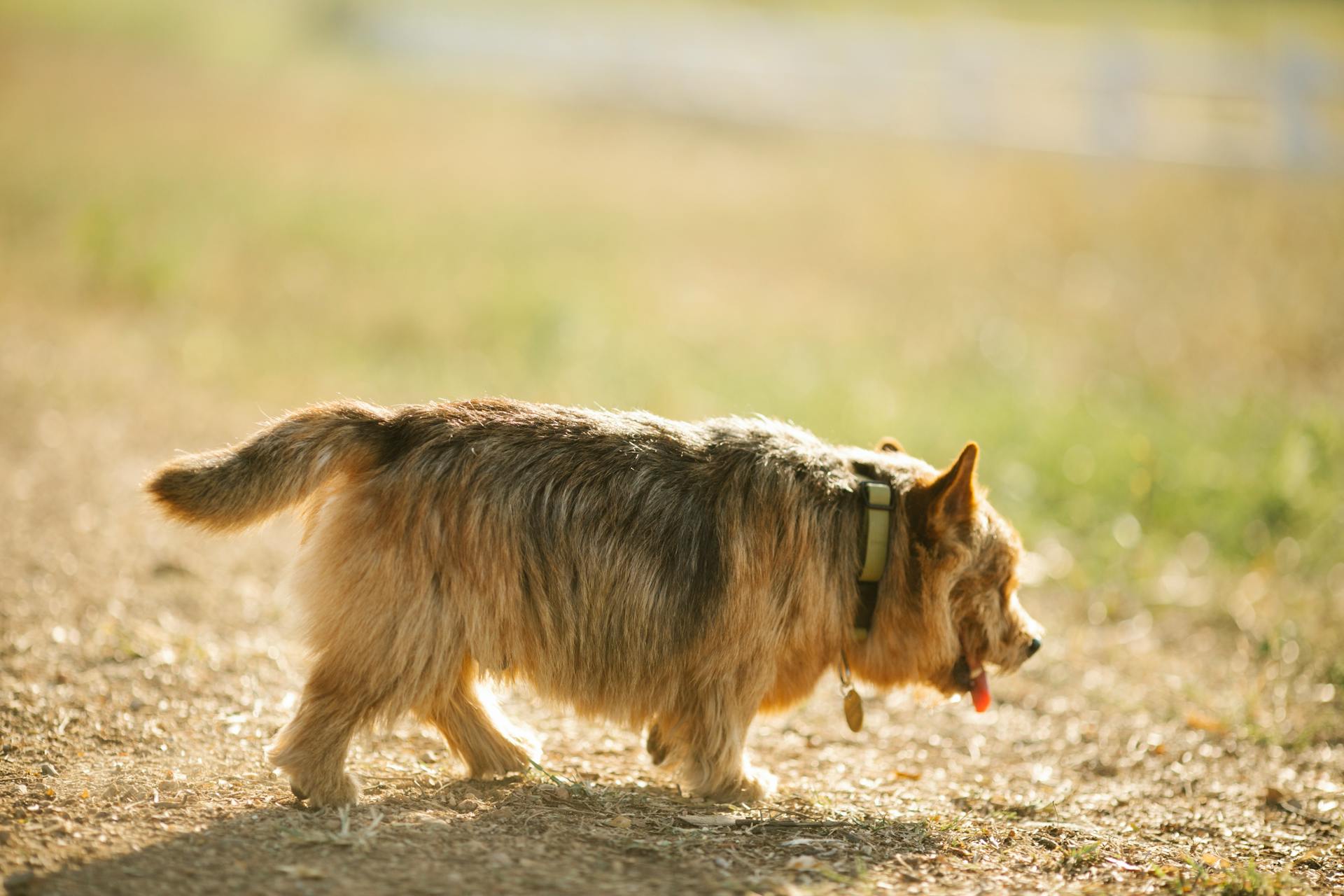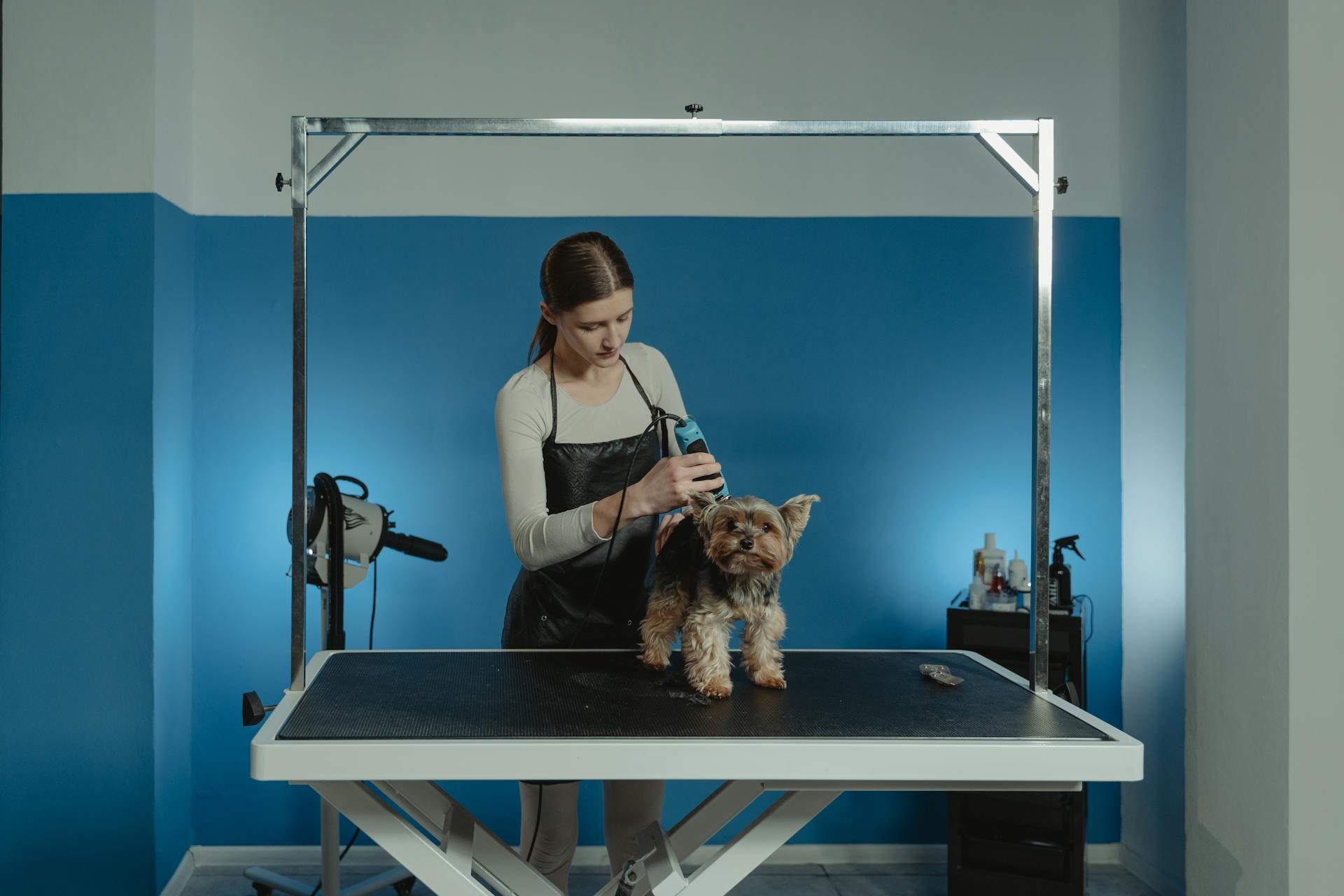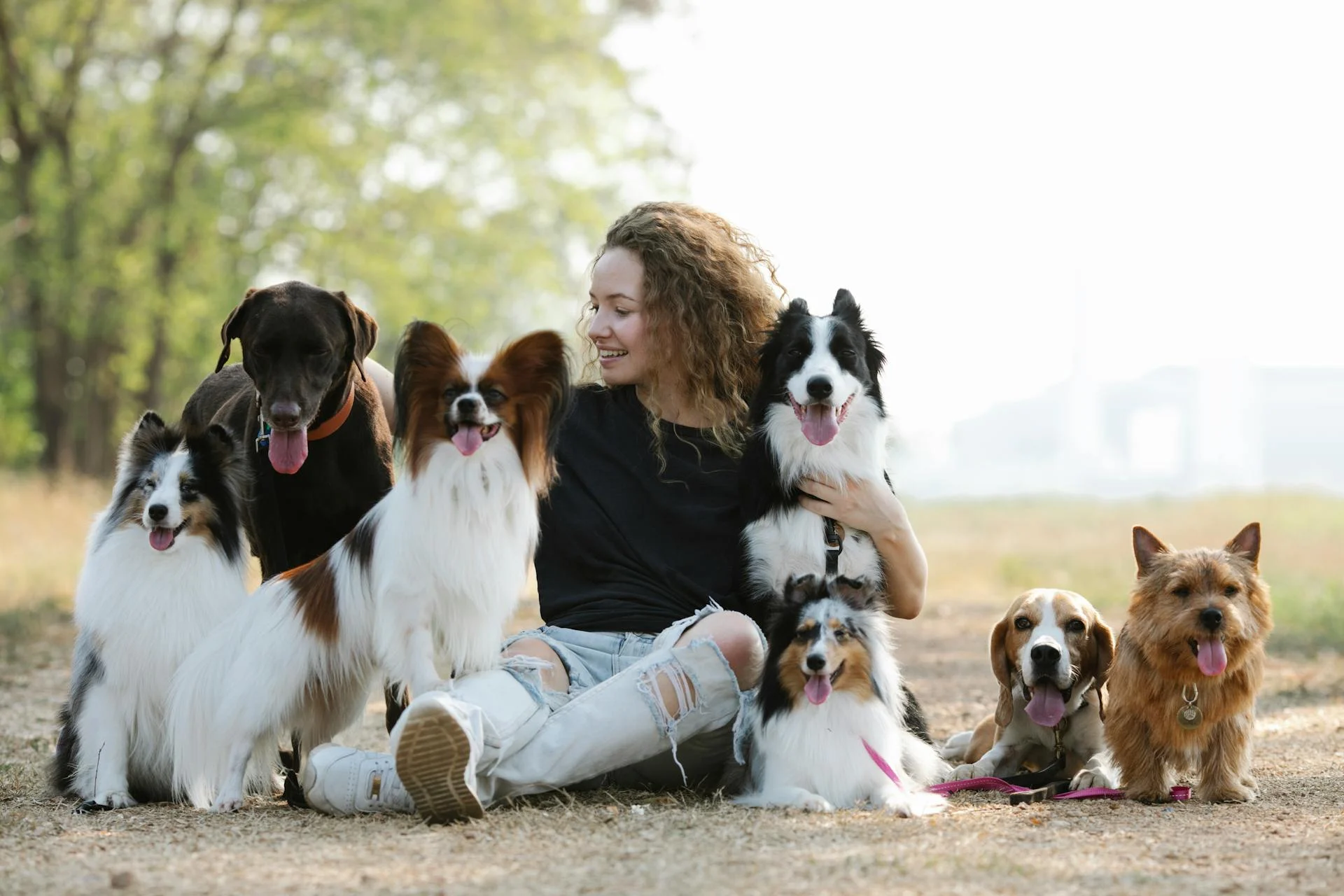
Norwich Terrier puppies are born after a gestation period of about 60-65 days. They typically weigh around 8-12 ounces at birth.
Their eyes are usually closed, and their ears are folded against their head. This is a normal feature of newborn puppies.
Norwich Terrier puppies are born with a thick coat of fur, which helps keep them warm. This coat will require regular grooming to prevent matting.
They are social animals and thrive on human interaction from an early age.
You might enjoy: Norwich Terrier vs Norfolk Terrier
Temperament and Personality
The Norwich Terrier puppy is a bundle of energy and joy, but they can also be a handful. They're naturally curious and love to explore their surroundings, which can sometimes get them into trouble if they're not properly supervised.
Norwich Terriers are known for their affectionate nature and love to be around people. They thrive on companionship and will follow you everywhere, making them great family dogs.
They're intelligent and active, which means they need plenty of physical and mental stimulation to keep them happy and healthy. This can include playtime with toys, balls, and even just playing with the people they love.
Norwich Terriers have a high prey drive, which means they might chase small animals if they get the chance. To prevent this, it's essential to host off-leash playtime in fenced-in areas or keep them on a leash when you're not in a secure space.
With proper training and socialization, Norwich Terriers can be easy to train and even-tempered. Consistent and early training can help manage their natural terrier behaviors, such as barking and digging.
Norwich Terriers are naturally alert and will bark if they spot anything suspicious. However, this can become a nuisance if not addressed from an early age, so it's crucial to teach them to calm down quickly.
These little dogs have a big personality and can be strong-willed at times. But with calm and confident owners who use positive reinforcement, they can learn to be well-behaved and obedient.
Care and Feeding
To keep your Norwich Terrier puppy happy and healthy, you'll want to establish a regular grooming routine. Brush them at least once a week to prevent matting and tangling.
Daily exercise is a must for this energetic breed. Aim for a couple of 10-15 minute walks or playtime in a fenced area to keep them stimulated and active.
Housetraining can be a challenge, but crate training can be a lifesaver. Use a crate to prevent accidents in the home and give your puppy a safe space to retreat to when they need a nap.
Broaden your view: English Bulldog Crate Size
Size
The Norwich Terrier is a small breed, standing 10 inches high at the shoulders.
Their compact size means they don't require as much space to move around, making them a great fit for city living or small homes.
At 12 pounds for both males and females, they are a lightweight breed that can easily keep up with active owners.
Despite their small stature, they should look stocky and not overweight.
Feeding
Feeding your Norwich Terrier requires some attention to detail, but don't worry, it's not rocket science. The recommended daily amount is 1/2 to 1 cup of high-quality dry food a day, divided into two meals.
Here's an interesting read: Will Shiba Inu Ever Reach 1 Cent

Each dog is an individual, just like people, and they don't all need the same amount of food. A highly active dog will need more than a couch potato dog, so be sure to adjust accordingly.
Dogs are prone to obesity, and Norwich Terriers are no exception. They'll eat anything that doesn't eat them first, so keep an eye on their food intake and make sure they're getting enough exercise.
To check if your Norwich is overweight, give them the eye test and the hands-on test. Look down at them and see if you can spot a waist, and then place your hands on their back to feel their ribs without having to press hard.
The quality of dog food you buy also makes a difference - the better the dog food, the further it will go toward nourishing your dog and the less of it you'll need to shake into their bowl.
You might enjoy: Puppys Food
Care

Taking good care of your Norwich Terrier is a breeze, as long as you're willing to put in the effort. They need to be brushed at least once a week to prevent matting and tangling of their fur.
Regular toothbrushing is also essential to maintain their dental health. Norwich Terriers are prone to dental issues, so don't skip this important step.
These dogs have plenty of energy, so daily exercise is a must. A 15- to 20-minute walk twice a day should be plenty to keep them happy and healthy.
Norwich Terriers are intelligent working dogs that thrive on having a job to do. They respond well to clear and consistent training, and making training sessions interesting can keep them engaged.
Housetraining can be a challenge, but crate training can be a lifesaver. A crate provides a safe space for your pup to retreat to when they need a break, and it can also help prevent accidents in the house.

Norwich Terriers are people dogs and need to be part of the family. They're not meant to spend their lives locked up in a crate or kennel, so make sure to give them plenty of attention and interaction.
A daily walk or playtime in a fenced area can easily satisfy your Norwich Terrier's exercise needs. They love to run and play, and they'll make wonderful workout partners whether you're walking, jogging, or hiking.
If you're not active yourself, playtime in the yard can be a great alternative. Norwich Terriers are happy to adapt to your lifestyle, as long as they get the exercise and attention they need.
In fact, Norwich Terriers are so smart that they need mental stimulation to prevent boredom. Dog puzzles can be a great way to keep them engaged and entertained when you're not around.
Their small size makes them perfect for apartment living, but a fenced yard is still the best option. This will give your pup plenty of room to run and play, and it's essential for their physical and mental health.
When taking your Norwich Terrier out for a walk, make sure to keep them on a leash and a harness. This will help prevent tracheal collapse and keep them safe.
Take a look at this: When Will Shiba Inu Hit $1
Grooming and Health
A Norwich Terrier puppy is a delightful addition to any family, but it's essential to consider their grooming and health needs. They have a distinctive double coat, with a hard, wiry topcoat and a soft undercoat.
Brushing is a must, ideally at least once a week, to remove dead hair and keep your Norwich clean. Regular brushing will also help prevent matting and tangling.
Their coat can be any shade of red, grizzle, wheaten, or black and tan, and they shed moderately. To maintain their coat's characteristic hard texture, you can either strip it twice a year or clip it. However, if you clip their coat, it may become lighter and softer, and more prone to shedding.
Their dental health is also crucial; brush their teeth at least two or three times a week to remove tartar buildup and bacteria. Daily brushing is even better to prevent gum disease and bad breath.
Take a look at this: 8 Week Old Boston Terrier
Here are some common health concerns to be aware of:
- Tracheal Collapse: A weakening of the tracheal rings, which can cause coughing, trouble breathing, and fainting.
- Elongated Soft Palate: An elongated soft palate can obstruct the airway and cause difficulty breathing.
- Epilepsy: A hereditary disorder that causes seizures, which can be treated with medication.
- Portosystemic Shunt: A condition where the blood flow is blocked, which can be a concern in Norwich Terriers.
- Cataracts: A condition where the lens of the eye becomes cloudy, which can be a concern in Norwich Terriers.
By being aware of these potential health concerns and taking steps to prevent them, you can help your Norwich Terrier puppy live a happy and healthy life.
Grooming
Grooming is an essential part of caring for your Norwich Terrier. They have a distinctive double coat, with a hard, wiry topcoat and a soft undercoat.
Regular grooming is necessary to maintain their coat's integrity, and there are two main schools of thought: clipping or hand stripping. Hand stripping can be time-consuming and uncomfortable for the dog if not done properly.
Brushing your Norwich Terrier at least once a week is crucial to remove dead hair and prevent matting. You should also limit baths to once every three months to avoid irritating their skin.
Daily brushing of your dog's teeth is essential to prevent tartar buildup and gum disease. In fact, small breeds like the Norwich are particularly prone to severe gingivitis.
Trimming your Norwich Terrier's nails regularly is also important, especially if they don't wear them down naturally. If you can hear their nails clicking on the floor, it's time for a trim.
By starting to brush and examine your puppy regularly, you can make grooming a positive experience and lay the groundwork for easy veterinary exams and handling in adulthood.
Health
The Norwich Terrier is generally a healthy breed, but like all breeds, they're prone to certain health conditions. Not all Norwich Terriers will get any or all of these diseases, but it's essential to be aware of them if you're considering this breed.
Their average lifespan is between 12 to 15 years, making them a long-term companion.
The Norwich Terrier is susceptible to tracheal collapse, a condition where the tracheal rings weaken and flatten, obstructing the airway. Signs of tracheal collapse include coughing that sounds like a honk, fainting, and an inability to exercise for long periods.
This condition is often treated medically, but surgery may be necessary if medical treatment doesn't work.
Elongated Soft Palate is another condition often seen in the Norwich Terrier breed. It's caused by an elongated soft palate that can obstruct the airway and cause difficulty in breathing.
The treatment for Elongated Soft Palate is surgical removal of the excess palate.
Epilepsy is also a concern in the Norwich Terrier breed, causing seizures in the dog. Epilepsy can be treated by medication, but it cannot be cured.
A dog can live a full and healthy life with the proper management of this hereditary disorder.
Here are some common health concerns in the Norwich Terrier breed:
- Tracheal Collapse
- Elongated Soft Palate
- Epilepsy
- Portosystemic shunt
- Cataracts
It's essential to work with a reputable breeder who has performed health clearances on the parents of your puppy. This includes testing for hip dysplasia, elbow dysplasia, hypothyroidism, and von Willebrand's disease.
Suggestion: Bernese Mountain Dog Hip Dysplasia
Frequently Asked Questions
How much do Norwich terriers cost?
Norwich terriers typically cost between $2,500 to $4,500 on the West Coast, with prices varying by location and breeder. If you're considering bringing a Norwich terrier into your family, learn more about the breed's needs and costs.
Is a Norwich Terrier a good family dog?
Yes, Norwich Terriers make great family dogs due to their playful and fun-loving nature. They're a long-lived breed, typically living 13-15 years, making them a wonderful addition to many families.
Does a Norwich Terrier bark a lot?
Norwich Terriers are prone to barking due to their terrier heritage, which was bred to hunt small vermin. Consistent training can help manage this behavior.
What is the difference between a Norwich and Norfolk Terrier?
The main difference between a Norwich and Norfolk Terrier is the shape of their ears, with Norwich Terriers having prick ears and Norfolk Terriers having drop ears. This distinctive feature helps identify each breed.
Featured Images: pexels.com
